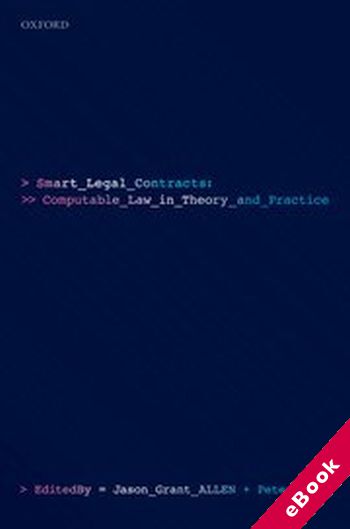
The device(s) you use to access the eBook content must be authorized with an Adobe ID before you download the product otherwise it will fail to register correctly.
For further information see https://www.wildy.com/ebook-formats
Once the order is confirmed an automated e-mail will be sent to you to allow you to download the eBook.
All eBooks are supplied firm sale and cannot be returned. If you believe there is a fault with your eBook then contact us on ebooks@wildy.com and we will help in resolving the issue. This does not affect your statutory rights.
Smart Legal Contracts: Computable Law in Theory and Practice is a landmark investigation into one of the most important trends at the interface of law and technology: the effort to harness emerging digital technologies to change the way that parties form and perform contracts. While developments in distributed ledger technology have brought the topic of 'smart contracts' into the mainstream of legal attention, this volume takes a broader approach to ask how computers can be used in the contracting process.
This book assesses how contractual promises are expressed in software and how code-based artefacts can be incorporated within more conventional legal structures. With incisive contributions from members of the judiciary, legal scholars, practitioners, and computer scientists, this book sets out to frame the borders of an emerging area of law and start a more productive dialogue between the various disciplines involved in the evolution of contracts as software. It provides the first step towards a more disciplined approach to computational contracts that avoids the techno-legal ambiguities of 'smart contracts' and reveals an emerging taxonomy of approaches to encoding contracts in whole or in part. Conceived and written during a time when major legal systems began to engage with the advent of contracts in computable form, and aimed at a fundamental level of enquiry, this collection will provide essential insight into future trends and will provide a point of orientation for future scholarship and innovation.